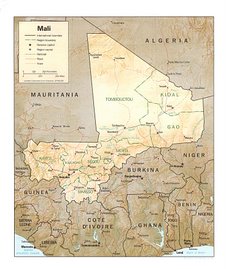Word in Tubaniso is that we find out our permanant sites before we head back to our training villages on Thursday. I hope that's true. If it is, Thursday will actually be a pretty exciting day. I believe we're having lunch with the US ambassador before heading out. Until then, I just wanted to add some random events and facts from Droit to make my life sound a little more interesting.
My LCF (language-culture facilitator) is Oscar Coulibaly. He's a 37 year old Malian from Segou (a Malian region). The four of us PCTs living in Droit really like him, and his matter-of-fact way of answering anything about himself. After reading his little biography in one of our volunteer books, we learned that he is married, does yoga and plays musical instruments. The next day I asked what he played, and he responded simply with "several instruments." That was it, no elaboration. Another time we asked if he was lonely, since his wife is in Bamako. He just said "yes" and went on with the rest of the day. He's just funny in that you have to push to find anything out about him...but at the same time he's completely adorable and sweet. It helps that he's super short and looks like he's about 15.
For those of you looking for Droit on a map, don't bother. The closest large town Moribabugu, though Droit is only about 30 kms outside of Bamako; to the northeast, I think.
Ok, joking cousins....This is the greatest thing thus far about Mali. There are somewhere around 80 family names in Mali, with a dozen or so different ethnic groups. They pride themselves on their diversity. To alleviate any ethnic tensions or family rivalries, they have joking cousins. Basically what this means is that there is at least one designated family for each other family to joke with. For example, the Coulibalys joke with the Fulfunes. Actually, the Coulibalys kind of joke with everyone. Anyways, whenever two people meet, if they are joking cousins they automatically go at it with each other. The most common joke involves one person telling another he eats beans, or some variation. It sounds odd, but it's actually hilarious. They even use joking cousins to settle disputes. If two people are fighting and find out they're joking cousins, all fighting is generally alleviated with jokes. Chelsea (a fellow Droit PCT) and I have decided America could benefit from this, and our American names are now going to be joking cousins. Bowens, if you meet any Brinks, tell them they eat beans.
In other news, the continent is currently trying to kill me and every other new PCT here. We all have variations of bacterial infections, reactions to medications and foods, amoebas, and even cold and flu bugs. I've been sick for a couple of days and feel pretty miserable. Eating is a total chore and I frequent the nyegen way too often. Oh well, what can you do. Probably 75% of us are sick. At least we're going through it together. I never thought I'd be so open with people I've known less than a month about such private bodily funtions. Don't worry, mom, I will be fine. The med office here is great. I'm glad I'm sick while in Tubaniso instead of Droit.
On that cheerful note I'm heading out. I'm sure I'll update again if and when I find out my site, or if anything else interesting happens. Or if I'm bored. Very likely. There is an internet cafe in Moribabugu, so I'm taking my laptop to site, and I may be able to update once or twice while I'm there. It's really expensive, though, so no promises.
